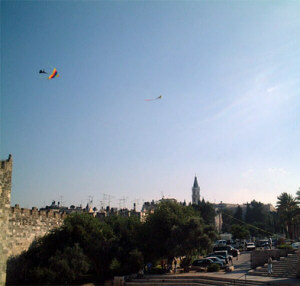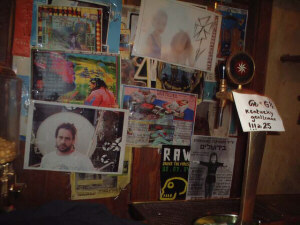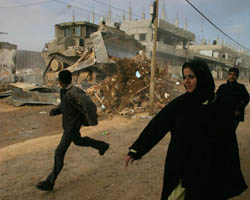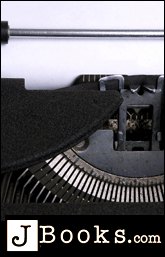 March 06
March 06
Something that isn't war
by Joanna Steinhardt
p. 2 of 3
I hadn’t been to the Old City in a few months, not since I met a young activist on my connecting flight from Warsaw to Tel Aviv, to whom I had offered my help, and shared a cab back to Jerusalem where, I learned, he would met his “contact” before entering the territories. He was bound for a refugee camp outside of Nablus, where he would teach puppetry to Palestinian children, together with other peace activists. He had been questioned for forty minutes by the Polish security at the Warsaw airport. Slight, pale, blond, visibly non-Jewish, he was so benign as to arouse suspicion—a suspicion which was only heightened by his guileless explanations about puppetry. He exuded the particular ambiance of punks, anarchists, and other suburban radicals in his destroyed Doc Martens and paint-splattered work pants, his quiet, nasal, and tentative voice, studying me carefully in the cab like a shy child, his words sparse and reflective. He was so pale, thin, and hunched that he was sickly-looking and appeared to me like a white angel that fluttered on the edges of the continent, like butterflies on the coast, a piece of America that had broken off and accompanied me as I fled. His name was Charles Edwards Roberts the Third, or Chip for short – a name that, if I hadn’t heard it in person, I might not have believed, it was so mythically American. Chip’s mythic quality made him seem precious and I offered to show him around the city before he headed into Palestine. We met the day after at Damascus gate and walked through the Muslim quarter and then into the Jewish Quarter, where we sat in a plaza, spacious and sunlit, surrounded by tourists shops and cafes. We talked about what it might be like for him “over there.” He said that he hadn’t read about the conflict except for one book, “but it was a graphic novel.” I recommended playing soccer with the kids as an easy way to form a bond, but he said that he didn’t play sports because when he was a baby, his skull was soft and doctors warned off contact sports. “Here,” he said, “feel,” and bowed his head downward, running his hand along the roof of his skull. I put my palm against his head and felt a subtle ridge beneath his soft, fine hair. He looked up with a faint, ironic smile. I had been eating a sandwich as we spoke and I folded up the remains, ready to throw it away, when Chip stopped me and said he would take it if I didn’t want the rest.  Apologizing, I told him I didn’t know he was hungry or I would have offered him some, but he told me that it wasn’t that he was hungry; rather, that he didn’t like to see food thrown away. He ate the last quarter of the sandwich in quick little bites and threw the plastic wrap in the trashcan at the edge of the square, a small act that reflected the obscure piety that seemed to animate his entire being.
Apologizing, I told him I didn’t know he was hungry or I would have offered him some, but he told me that it wasn’t that he was hungry; rather, that he didn’t like to see food thrown away. He ate the last quarter of the sandwich in quick little bites and threw the plastic wrap in the trashcan at the edge of the square, a small act that reflected the obscure piety that seemed to animate his entire being.
I told the reporter that I almost never go to the Old City, except when showing people around. Later, when I found what he wrote about that night, I learned that he remembered this comment, and related it with more than an edge of accusation, implying that although I live across the street from them, I never mingle with the Palestinians or venture into their world. I didn’t explain to him – like so many things I didn’t explain – that it’s not a chaos I feel privileged to enjoy.
To cross the street a block from my apartment and go into East Jerusalem was to enter another world.
The reporter gave me directions to his hotel, near Damascus Gate, but it didn’t help. I didn’t know which street to take when I stood facing the descending amphitheatre steps that lead to the square in front of that enormous edifice that surrounds the ancient gate. It was abandoned at that hour of the night, dark and gray in the diffuse light from buildings across the street. I stood looking around me, caught in the resonant emptiness, staring at a two-story cafe with a fluorescent sign and floor-high windows, a long counter along the back wall that reminded me of an American fast-food restaurant, but unlike such places, decorated in rich brown tiles and stained glass. It was nine o’clock on a Thursday night and the cafe was full of customers. In front of the double door entrance sat two men at a small table, one in traditional loose pants, a sand-colored vest and a Muslim hat, and the other in jeans and a worn button-down shirt. The pair struck me as the uncanny equivalent of a pair of archetypal Jews that I might see in a café, one in a black suit with a white button-down and the black fedora of the ultra-Orthodox, and the other in jeans and a t-shirt, engrossed in conversation one with the other in such a way that it’s unclear if they’re friends or relatives, or if one is perhaps a Rabbi addressing the spiritual inquiries of the other; and if they are friends or relatives, then one begins to wonder, who started out religious and who secular. How did the one leave the first world and enter the other? Which story belonged to whom?
“You’re giving up already?” the reporter asked when I called and told him I was still confused and suggested that he come out and meet me. His small voice was made of full sentences that began and ended with a crisp edge, signs of an exacting intelligence.
He sat in a cafe at the end of the street, not far from where I had started out. He was drinking red wine and reading Virilio. “Do you want to stay here?” I asked him.
“As you wish,” he replied, his face falling ever so slightly as he looked me in the eye with a reticence I was unable to read. His mouth, as he said this, seemed to move as faintly as possible, as if even this modest abstention hoped to erase the intrusive evidence of its existence.
“As you wish”: so unexpected was this response that I was momentarily paralyzed with what I can only describe as a kind of fright.
I suggested we go to a bar in town, one I had already chosen long before, and so he gathered his things and paid, asking for the bill in awkward Arabic. We began walking.
The Old City at night; the Muslim Quarter. I’ve never experienced a space quite like it. The alleys are bathed in an orangish darkness and a dry coolness emanates from the wide stones on which ones shoes slap and skid, smoothed by centuries of coming and going, as from the stones of the buildings, which seem less like buildings than the inner walls of a massive, marble hive in which people live, withdrawn into their cool, dark quarters. As we walk, my eyes are drawn to each opening in the stone walls that enclose us and propel us forward—a window, a gateway, an open door, leading into a covered passageway whose end is lit by a dim light from beyond the turn. Occasionally, our descent is disturbed by a running boy or a few, and in this streaming mirage brimming casually with the density of home and life, our conversation stopped and started as is often the case with strangers, caught in formal chatter and questions, to which he would not always answer but often fell silent, leaving the natural distraction of our surroundings to fill in for what he demurred to insert into the space between us. He was tall and thin, wearing black narrow pants and black blazer, with black leather shoes that hit the stones on the ground with a clean tapping sound. His facial features were small and when he disagreed with something, he would straighten his neck as if he was withdrawing from the conversation and furrow his eyebrows in doubt. I began to understand that although I appreciate silence, and often prefer it, silence was for him a pervasive aspect of his character. It was a silence of caution and observation but also, I sensed, one of aesthetics and a carefully guarded inner space. As with Chip, I ended up taking him to the Western Wall because all the roads I know in the Old City lead there, and as we went through the metal detector at the security check leading through the tunnel that opens out onto the expanse in front of the Western Wall, with its photogenic view of the shimmering dome of Haram Al-Sharif, the Dome of the Rock, he stopped to take the ipod out from his pants pocket and I could feel him stiffen and bristle at the presence of the security guard, ensconced in his bullet proof vest and gun holster, singing a mizrachi love song to himself as he eyed us with an aloof, knowing gaze.
“Fuck,” said the reporter as we emerged, “if only he could know what I’ve seen...” And again, “Fuck,” with soft insistence, and for the first time I saw the edge in him—the intolerance of a moralist, the impatience of an anarchist. He asked some questions about the hats of the Orthodox Jews; I answered him and I gave him the official history of the site, and after a few moments standing and talking, we made our way up to Zion gate, and I told him the story of Purim, which was that night, and I felt a distant sense of embarrassment over the relatively hygienic cleanliness and airiness of the Jewish Quarter. These feelings were rising and descending within me; I couldn’t attach them to any particular comment he had made but could only ascribe them to a vague paranoia on my part. As I gave him a brief history of my life up until then, his discretion slowly gave way. I learned that he had lived in Jerusalem with an ex-girlfriend for four months years before; that he had always felt an intense, uncomfortable pressure upon entered the city; and that now it seemed even stronger.
 When we arrived at the bar behind the market, he sat down with a look of awe on his face, having lived in an Arab city for three years before moving to the Territories, and thus having been so long outside of the kind of societies that produce such things as bars named after anarchists, as this one was, plastered with posters for underground shows, album releases and the kind of graffiti devised by art students to arouse the masses. I said to him, “I wanted to take you to the crevice of the crevice of the crevice of what doesn’t exist over there,” referring to the city in which he was stationed. He laughed, leaning forward, a silent, appreciative laugh. When he laughed, his small mouth spread wide into a beautiful grin.
When we arrived at the bar behind the market, he sat down with a look of awe on his face, having lived in an Arab city for three years before moving to the Territories, and thus having been so long outside of the kind of societies that produce such things as bars named after anarchists, as this one was, plastered with posters for underground shows, album releases and the kind of graffiti devised by art students to arouse the masses. I said to him, “I wanted to take you to the crevice of the crevice of the crevice of what doesn’t exist over there,” referring to the city in which he was stationed. He laughed, leaning forward, a silent, appreciative laugh. When he laughed, his small mouth spread wide into a beautiful grin.
I ordered “the cheapest whiskey,” and he laughed again, the same laugh of disbelief, and said he would drink whatever I drank. We drank slowly and talked about religion and politics. He said, about monotheistic religions that set down patriarchal rules and directed ones attentions towards an abstract God in heaven, “Life is just too fucking beautiful to waste on this bullshit,” squinting his eyes in fervor. I could see that he was trying to approximate the words for a conviction that didn't quite fit the confines of language. It was too wide or too deep,resting somewhere at the base of his being. I told him about my thesis project studying American born-again Jews who are part of the religious Zionist neo-Hasidic subculture in Israel. I described my most recent interview with A., who had once been a radical activist, demonstrating against the WTO and government confiscation of Indian lands, and who now lives on a small settlement in an area near Hebron, where he’s been learning in a yeshiva for four years. After a pause in the interview, A. looked over at a stack of books on my desk, saw Said’s Orientalism, and remarked, “Ah, Said, he’s great,” and I agreed, only somewhat bemused by the irony of the exchange, and then A. said, “You should read Culture and Imperialism,” a comment that ever since I cannot seem to get my head around. I explained to the reporter that at face value, I can understand how A. might say such a thing, as he was educated at a liberal arts school in the era of post-colonialism and multiculturalism, but still can’t reconcile the obvious dissonance of the scene.

After another look of blank disbelief, the reporter tried to interpret what had occurred. He explained that my friend—as he called A.—was starting at one point in history and trying to go backward, to reclaim a certain freedom that he couldn’t find in the world today, at the expense of others; but more than that, he added, this scene that I had described brought an intense feeling of despair in relation to the future of the Palestinian people, a future we had already discussed after I asked him about the people he had met “over there.” He expressed this despair by saying that this radical leftist, who was now living on a settlement in search of spirituality, verified his belief that the Palestinian people were being slowly consumed alive by a multi-headed beast. This inexplicably brought to my mind an  image from the New York Times that I had seen when I was last in the States, in an article about a mole whose mouth was ringed by numerous fleshy appendages that extended outward like a star and glistened, pinkish like the inside of one’s lips, which were used to shovel insects into the creature’s mouth, thus achieving through this bizarre physiognomy the fastest known record of food intake in the animal world; although it’s more likely that what the reporter had in mind were the massive Caterpillar bulldozers used to destroy homes in the territories, about which he told me later in the evening that they were nearly as big as the room in which we were sitting.
image from the New York Times that I had seen when I was last in the States, in an article about a mole whose mouth was ringed by numerous fleshy appendages that extended outward like a star and glistened, pinkish like the inside of one’s lips, which were used to shovel insects into the creature’s mouth, thus achieving through this bizarre physiognomy the fastest known record of food intake in the animal world; although it’s more likely that what the reporter had in mind were the massive Caterpillar bulldozers used to destroy homes in the territories, about which he told me later in the evening that they were nearly as big as the room in which we were sitting.
We sat there for a few hours. At one point, I looked over and his head was small, hung downward, his eyebrows furrowed, sitting upright with excellent posture in his black suit jacket. I could see etched on his face a damp and personal darkness. I didn’t look long. I didn’t want to intrude.
We left the bar after several hours and began walking back towards the city, this time down Agrippas, the street that skirts the market, next to Nachlaot, the neighborhood where he had lived with his girlfriend more than four years ago. He wanted to find the apartment they had lived in, so, although I knew the search through the meandering alleys would be in vain, I entertained his whim and we walked aimlessly among the alleys and stone buildings, homes I was familiar with (although I did not mention this) through the religious community that I had once been a part of, a subgroup of which I was now researching through interviews with people like A. The reporter’s only memory of the apartment where he had lived with his girlfriend was an anarchist sign on the wall across the street. She had taken a picture, with him posing in front of it. For a moment, he leaned against a wall with a grin, the memory coming back to life. “Like this,” he said. After wandering for a few minutes, he gave up and we made our way back out to Agrippas. As we walked, I asked him if he was still in touch with her. He asked who I meant. The ex-girlfriend, I answered. “Oh, no,” he said, quietly. Curious, I asked where she was now. He paused and then told me she was dead.
“I’m sorry,” I replied.
Another moment passed between us and I asked how she died. A car accident, he said. We were still walking and the silence was filled with the rhythm of our shared movement, the white noise of slight drunkenness swirling peacefully around us. Unafraid, I then asked him if they had been dating when she died. I almost didn’t hear him answer, for his words were exceptionally soft. “She was my fiancé,” he said. It fell from his mouth invisible and weightless, precious as a gem for it exposed, in a moment, his guarded silence and his elusive aura. These diffuse qualities seemed to condense like mist into the suddenly very real human figure walking sleepily beside me.









